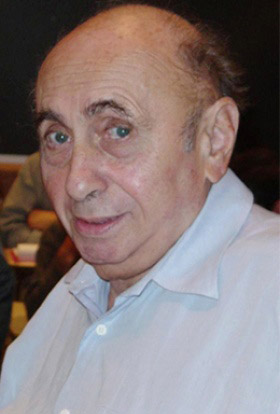August 2016
 We are sad to report that András Hajnal, who served as Director of DIMACS from 1994 to 1995, passed away on July 30 at the age of 85.
We are sad to report that András Hajnal, who served as Director of DIMACS from 1994 to 1995, passed away on July 30 at the age of 85.
Hajnal came to DIMACS after a 40-year career at Eötvös Loránd University in Budapest, and remained at Rutgers as a professor in the Department of Mathematics until his retirement in 2004 when he returned to Hungary.
He was elected in 1982 as member of the Hungarian Academy of Sciences and directed its Mathematical Institute from 1982 to 1992. He served as general secretary of the János Bolyai Mathematical Society from 1980 to 1990, and president of the society from 1990 to 1994. His contributions to mathematics were recognized by prizes that include the Academy Prize in 1967, Tibor Szele medal from the János Bolyai Mathematical Society in 1980, and Middle Cross Merit Order Medal from the President of the Republic of Hungary in 2013.
Hajnal published over 150 research papers during his career. He is well known for his work on set theory and was an Honorary President of the European Set Theory Society. Widely viewed as one of the founders of combinatorial set theory, his ground breaking work in collaboration with Paul Erdős and Richard Rado led to the theory of set mappings and the partition calculus. He was the first to introduce and study relative constructibility, extending the work of Gödel, and his celebrated joint result with Galvin on cardinal exponentiation inspired Shelah to create PCF theory. He also published more than 30 papers on set theoretic topology, and in so doing, played an essential role in the introduction of the tools and methods of modern set theory to problems of general topology. In addition to his work in set theory, he made significant contributions to finite combinatorics as well. Perhaps the best known of these is the Hajnal-Szemerédi theorem on equitable coloring of graphs that proved a conjecture of Erdős. He had 56 joint papers with Paul Erdős, making him Erdős’s second-most frequent coauthor.
During his time as DIMACS Director, Hajnal enhanced the already-strong connection between DIMACS and the international combinatorics community, and his efforts added significantly to the international reputation of the center.
DIMACS paid tribute to Hajnal by co-sponsoring conferences in honor of his 70th and 80th birthdays, the first on Set Theory and second on Finite and Infinite Sets. His 70th birthday conference led to publication of a DIMACS Volume entitled Set Theory: The Hajnal Conference in 2002. The book’s editor, Simon Thomas, said in the preface, “There have been few conferences which have been easier to organise. Because of the respect and deep affection which everybody in Set Theory has for András, there was no difficulty in putting together an outstanding program, which included many of the leaders in the field. … Everybody is aware of his fundamental work in combinatorial set theory, cardinal arithmetic, set theoretic topology, as well as in finite and infinite combinatorics.”


